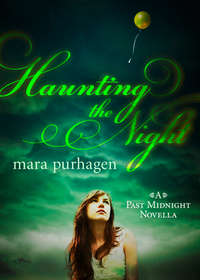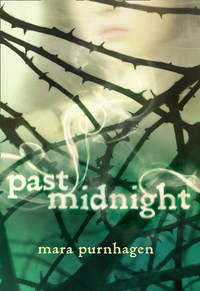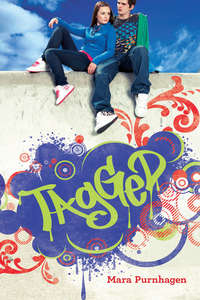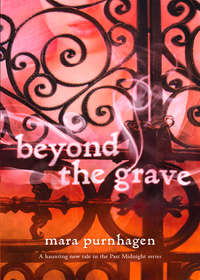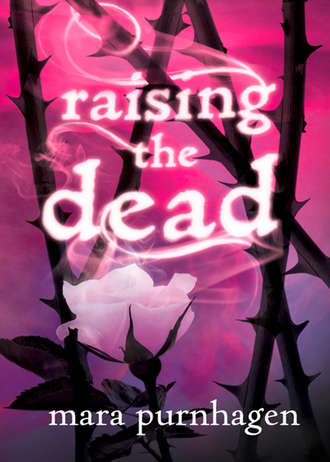
Полная версия
Raising The Dead
He groaned. “Did you see them at breakfast? Can’t they at least tone it down when I’m around?”
“It was a little much,” I agreed.
He leaned his head against my bed. “And I’m so tired. Shane snores like a wild boar.”
“Wild boars snore?”
“You know what I mean.” He closed his eyes. “I need a nap.”
I got up. “Take my bed for a few hours.”
“Really?”
“Sure.” I had changed the sheets the night before, so I was pretty sure there were no drool spots on my pillow.
“Well, yeah, if you’re okay with me sleeping in your bed.” Noah pulled himself off the floor. We stood facing each other for a moment. He was so close I could smell the cinnamon on his breath and I wondered if I should just step forward and kiss him. I couldn’t, though. I wasn’t that brave.
“Sweet dreams,” I said, hoping he couldn’t hear the pounding of my heart.
I closed the door behind me and went downstairs. Noah was in my room, in my bed. It made me giddy, and I tried not to smile too widely.
Downstairs, Mom was taking the pizza out of the oven. “Where’s Noah?”
I sat down at the table. “He wanted to take a nap. I guess he’s had a hard time sleeping because of Shane’s snoring.”
“Tell me about it,” Trisha muttered.
Mom and I shared an amused glance. “Well, dinner’s ready. We’ll save him some for later.”
After dinner, I stayed in the kitchen and called Avery. “Guess who’s sleeping in my bed right now?”
“Seriously?”
I curled a strand of hair around my finger. “He’s up there right now. That’s a good sign, right?”
“No.”
“What?” I was confused. Why wasn’t Avery excited for me?
She sighed. “I don’t think it’s a sign of anything, Charlotte.”
“But—“
“Look, I know you like him, but I think you’re setting yourself up to get hurt.” She cleared her throat. “I need to tell you something. You’re not going to like it, which I why I didn’t tell you earlier.”
I listened carefully as Avery described an encounter she had with Noah during the homecoming dance. She had watched as Noah and I danced to a slow song. When the song ended, I had gone over to talk with Callie and some of our other friends while Noah went to get us drinks. Avery went up to him. She mentioned that we seemed to be hitting it off, but Noah had shaken his head. “We’re friends only,” he said. His voice, Avery said, was emphatic. “She knows that, right?” he’d asked her. “That we’re friends and nothing more?” Avery said that I did know that. She then asked Noah to go out to her car and get a jacket for her. “I wanted to talk with you right away,” she said, “but then Jared and I started talking and I got distracted.”
“Oh.” The giddiness that had consumed me earlier evaporated.
“This is a good thing, Charlotte.”
“How is this a good thing? The guy I like wants nothing to do with me.”
“That’s not true. He likes you, but not in the way you want.”
“Again—how is that a good thing?”
Avery was quiet for a second. When she spoke, her voice was softer. “Charlotte, now you know. Now you can move on and find someone who wants to be more than a friend. Instead of focusing on a relationship that will never happen, you can open to the possibility of someone else.”
“You sound like you’re speaking from experience.”
“Not exactly.” She sighed. “I tried setting up Callie with someone once. She was really into him, but he didn’t return the feelings. It was a disaster.”
Now it was my turn to be quiet. Maybe Avery was right. It was time to accept a nice, simple friendship with Noah and put my romantic energy into someone else.
“You’re my friend,” Avery said. “I don’t want to see you get hurt. That’s the only reason I’m telling you this.”
“I know.” I could hear everyone in the dining room discussing the storm. Then I heard Noah walking down the stairs. “I have to go. Noah’s awake.”
“Sure. And remember—there’s nothing wrong with having a great guy friend.”
“Right.”
“Besides,” Avery continued. “Callie says she knows a football player who would be good for you.”
We said goodbye and I hung up. Noah walked into the kitchen, his hair pressed to one side from where he’d slept on it. I resisted the urge to brush my fingers through it.
“How was the nap?” I asked.
“Good. I’m starving, though.”
I got up from the table. “I’ll reheat the pizza for you.”
He sat down, still looking sleepy. “Thanks.”
“No problem.” I took the pizza out of the fridge. “After all, what are friends for?”
Chapter Three
The rain stopped roaring on Sunday night. By Monday, it was barely a drizzle. The sky still loomed gray and bloated clouds moved fast and low, but the worst was finally over.
“I guess we’ll be leaving,” Trisha announced after breakfast on Monday. I had gotten used to having everyone around. We had developed a cozy routine revolving around simple meals and old movies. The house would seem empty without our guests, but part of me was relieved: it was difficult to be around Noah all the time. I kept noticing little things about him that I liked, such as the way he was careful to always clean up after himself and help my mom, and how he laughed at something on TV. It would be easier to see him as just a friend, I decided, once there was some distance between us.
With school officially canceled, I focused on helping my parents, who had reached out to overwhelmed authorities and offered to assist in their casket cleanup efforts. Over two dozen coffins had been unearthed during the storm, and it was essential to get them back to their proper burial spaces. One had been discovered wedged in the cart corral at a grocery store. Two were found lodged between trees at a local playground. And several had floated all the way to the high school, where they came to a strange stop on the drenched football field. The image of the splintered wooden boxes sitting near the 50-yard mark dominated the local media. Dad was not amused.
“There are thousands of people without power right now, and this is what makes the news?”
Despite the fact that he made a living off people’s intense interest in life after death, he was constantly annoyed by public fascination with the subject.
Mom researched local cemeteries, made endless calls, and confirmed that the coffins had come from a tiny graveyard a mile away.
“Some of them are from before the Civil War,” she told me and Dad. I had raided the pantry to produce dinner, which consisted of canned spaghetti with meatballs and buttered wheat bread. After a weekend without a trip to the store, canned goods were all we had left, but it was practically gourmet by my family’s standards.
I automatically grabbed ginger ale out of the fridge because I knew Noah liked it, then put it back when I remembered that he was gone. He was probably sick of sleeping on the couch and being surrounded by Shane and my family all day, I reasoned. He was probably sick of me, for that matter. After the time we spent in my room and his nap on my bed, he had seemed extra distant. Maybe he had sensed my crush, and was trying to define clearer boundaries. He wouldn’t need to worry about me, though—I was determined to take Avery’s advice and move on to someone who was interested.
“The police have taken custody of a dozen coffins so far,” Mom continued. “They moved them to the morgue already.”
“How?” Dad asked. I couldn’t imagine a flatbed truck stacked with century-old caskets driving through town. That was definitely an image that would attract the local news. Mom’s reply surprised me.
“Garbage trucks.”
“They put them on garbage trucks?” I couldn’t disguise the disgust in my voice. It seemed so disrespectful.
“Yes,” Mom confirmed. “The trucks are big enough to hold the coffins and don’t attract attention.”
“Still,” I said. “It seems so gross.”
“It’s practical,” Dad said. “These people have been dead for so long that they have no family members who would remember them. It’s the best way to transport them without attracting unnecessary attention.” He nodded, satisfied. “Very smart.”
It may have been practical and smart, but I couldn’t help think of the other Charlotte, the girl who had died over a hundred years earlier and who had spoken to me in Charleston. I wouldn’t want her thrown into the back of a garbage truck. I wouldn’t want anyone carted around that way. It was dehumanizing.
“We’ll meet with the caretaker tomorrow morning,” Mom said. “It’s such an old, tiny little cemetery that it’s basically been forgotten. The man I spoke with mows the grass twice a year, and that’s about it. This whole situation has him rattled.”
“But he’s willing to accept our help?” Dad asked.
“Yes.” Mom played with her fork. I was pleased to see that she had eaten all of the dinner I had single-handedly prepared, even if it was simply canned food heated in the oven. “He understands that the bodies need to be interred as quickly as possible. He also understands that we have an historical interest in the work.”
Historical interest. It was a fancy way of saying that my parents like to look at old dead bodies. One of Mom’s stock lectures focused on historical burial rites and practices. This was like winning the corpse research lottery.
She explained that she wanted to visit the cemetery first. A geological survey team would be there to make sure the ground was safe and that the caskets could be returned to the earth.
“How are you going to match the bodies with their gravestones?” I asked.
“That’s where my expertise comes in.” Mom finished her dinner and moved her plate to the side. “We’ll start by examining artifacts left with the bodies. How they’re dressed will help narrow down a time frame, as well. But we may not be able to correctly identify each one.”
“We’re talking about centuries-old wood,” Dad said. “How many even survived the flood intact?”
“Not many. But there’s about a dozen complete caskets. Cracked, but whole.”
“So some of the caskets aren’t whole?” I looked down at my half-eaten spaghetti. I wasn’t so hungry anymore.
“No. Most of them were damaged too heavily. Chances are the remains inside weren’t substantial, though.”
I hoped not. I could imagine someone emerging from their house after days stuck inside, only to discover a withered arm resting on the sopping wet lawn. My parents’ task was a strange one, but it held importance. It helped restore a kind of peace.
“How can I help?”
Mom and Dad looked at me. “We weren’t planning on having you help,” Dad said.
“We didn’t think this would be something you would be interested in,” Mom rushed to add.
“I’m not.” I had no intention of lifting coffin lids and peeking in. But I was used to being a part of the family team. It never occurred to me that I wouldn’t be involved in some small way. “I was thinking of clerical stuff or research or whatever. But if you don’t need me, that’s fine.”
“Clerical work,” Mom repeated. “I’m sure we could come up with something.”
“You could work from home.” Dad smiled. “We’ll call you if we need anything.”
It was a brush-off, and despite the fact that this was not a project I was eager to get too involved with, my parents’ quick dismissal of me stung. After dinner I went to my room and called Annalise.
Конец ознакомительного фрагмента.
Текст предоставлен ООО «ЛитРес».
Прочитайте эту книгу целиком, купив полную легальную версию на ЛитРес.
Безопасно оплатить книгу можно банковской картой Visa, MasterCard, Maestro, со счета мобильного телефона, с платежного терминала, в салоне МТС или Связной, через PayPal, WebMoney, Яндекс.Деньги, QIWI Кошелек, бонусными картами или другим удобным Вам способом.


